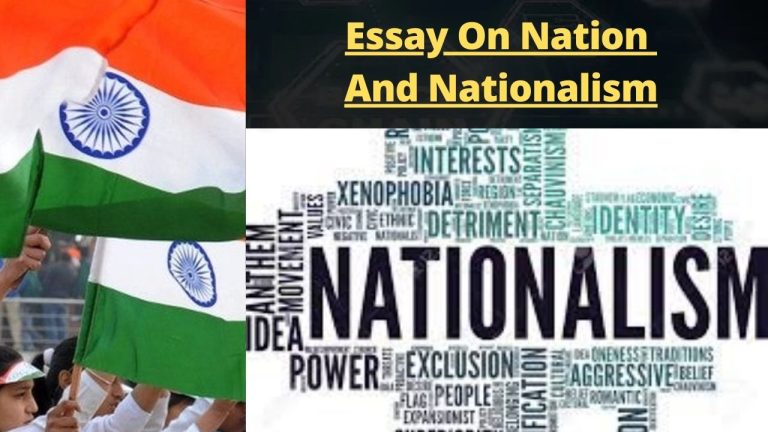"Advertisement"
Essay On Nation and Nationalism
Hello My Dear Friend, In this post “Essay On Nation and Nationalism“, We will be reading about the Nation and Nationalism as an Essay in detail. So…
Let’s Start…
Essay On Nation and Nationalism
Introduction
The concepts of nation and nationalism have played a pivotal role in shaping the world’s political, social, and cultural landscapes.
These notions hold significant importance as they define a sense of identity, belonging, and shared values among a group of people.
The complex interplay between the concepts of nation and nationalism has led to both unification and division, progress and conflict.
In this essay, we will delve deep into the intricacies of nation and nationalism, examining their meanings, historical evolution, and contemporary relevance.
Defining Nation and Nationalism
A nation can be described as a community of people bound together by shared characteristics such as history, culture, language, and territory.
It encompasses a feeling of belongingness and a shared identity that transcends individual differences.
Nationalism, on the other hand, refers to the ideologies, beliefs, and sentiments that center around the promotion and protection of a nation’s interests.
It often involves a fervent loyalty to one’s nation and can manifest in various forms, including cultural pride, political activism, and even conflicts in extreme cases.
Historical Evolution of Nation and Nationalism
The modern concept of nationhood and nationalism emerged in the 18th and 19th centuries as a response to the decline of traditional empires and feudal systems.
The French Revolution, for instance, played a pivotal role in shaping the idea of a nation-state. The slogan “Liberty, Equality, Fraternity” highlighted the principles that united the French people as a nation.
This wave of nationalism spread across Europe, leading to the formation of new nation-states and the reconfiguration of political boundaries.
The 19th century also witnessed the rise of Romantic nationalism, emphasizing cultural heritage and shared traditions. This cultural nationalism celebrated folklore, language, and art as expressions of a nation’s unique identity.
Moreover, the spread of print media and education facilitated the dissemination of nationalist ideas, contributing to the growth of a collective consciousness among various communities.
Interplay Between Nation, Nationalism, and Identity
Nation and nationalism are closely intertwined with individual and collective identity. They provide individuals with a sense of belonging and purpose.
People often find comfort in identifying with a group that shares similar values and aspirations. However, this affiliation can sometimes lead to exclusion or discrimination against those who do not fit the perceived norms of the nation.
National identity can also be fluid and complex, especially in multicultural societies. The coexistence of various ethnic, linguistic, and religious groups within a nation can both enrich its cultural fabric and pose challenges to a unified national identity.
Striking a balance between celebrating diversity and fostering a sense of unity is a continuous endeavor for many nations.
Positive and Negative Aspects of Nationalism
Nationalism, like any ideology, has both positive and negative aspects. On the positive side, it can drive social cohesion, inspire collective action, and promote a sense of responsibility toward fellow citizens.
Nationalism often serves as a rallying point during times of crisis, fostering resilience and unity among people.
However, excessive and extreme forms of nationalism can lead to exclusivity, ethnocentrism, and even violence. History bears witness to instances where extreme nationalism fueled conflicts and genocides.
The balance between a healthy pride in one’s nation and a dangerous sense of superiority is delicate, requiring thoughtful consideration and vigilance.
Contemporary Relevance
In today’s interconnected world, the concepts of nation and nationalism continue to be relevant, albeit with new challenges.
Globalization and increased migration have led to diverse societies where multiple national identities coexist. This calls for a nuanced understanding of nationalism that embraces diversity while preserving core values.
Moreover, digital communication and social media have transformed the way nationalism is expressed and experienced.
Online platforms can amplify nationalist sentiments, enabling rapid mobilization and potentially fostering divisive narratives.
Striking a balance between free expression and responsible discourse is crucial to avoid the negative consequences of online nationalism.
Conclusion
In conclusion, the concepts of nation and nationalism are deeply rooted in history and culture, shaping societies and influencing individuals’ identities and actions.
While nationalism can be a driving force for unity and progress, it should be approached with caution to prevent it from escalating into conflicts and divisions.
Embracing a sense of national pride while respecting the diversity within a nation is the key to harnessing the positive aspects of nationalism.
As the world continues to evolve, the dynamic interplay between nation and nationalism will undoubtedly remain a significant aspect of human society.
Finally, Thanks For Reading “Essay On Nation and Nationalism“.
If you have any questions related to “Essay On Nation and Nationalism“, So, please comment below.
Must Read:
